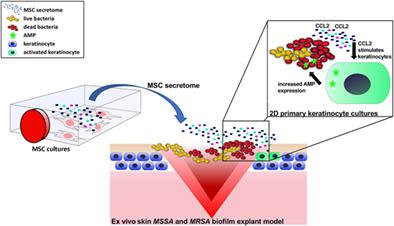当前位置:
X-MOL 学术
›
Stem Cells Transl. Med.
›
论文详情
Our official English website, www.x-mol.net, welcomes your
feedback! (Note: you will need to create a separate account there.)
Mesenchymal stromal cell-secreted CCL2 promotes antibacterial defense mechanisms through increased antimicrobial peptide expression in keratinocytes
STEM CELLS Translational Medicine ( IF 5.4 ) Pub Date : 2021-09-16 , DOI: 10.1002/sctm.21-0058 Charlotte Marx 1 , Sophia Gardner 1 , Rebecca M Harman 1 , Bettina Wagner 2 , Gerlinde R Van de Walle 1
STEM CELLS Translational Medicine ( IF 5.4 ) Pub Date : 2021-09-16 , DOI: 10.1002/sctm.21-0058 Charlotte Marx 1 , Sophia Gardner 1 , Rebecca M Harman 1 , Bettina Wagner 2 , Gerlinde R Van de Walle 1
Affiliation

|
Mesenchymal stromal cells (MSCs) from both humans and horses, which represent a clinically relevant translation animal model for human cutaneous wound healing, were recently found to possess antimicrobial properties against planktonic bacteria, and in the case of equine MSCs, also against biofilms. This, together with previous findings that human and equine MSCs promote angiogenesis and wound healing, makes these cells an attractive approach to treat infected cutaneous wounds in both species. The anti-biofilm activities of equine MSC, via secretion of cysteine proteases, have only been demonstrated in vitro, thus lacking information about in vivo relevance. Moreover, the effects of the equine MSC secretome on resident skin cells have not yet been explored. The goals of this study were to (a) test the efficacy of the MSC secretome in a physiologically relevant ex vivo equine skin biofilm explant model and (b) explore the impact of the MSC secretome on the antimicrobial defense mechanisms of resident skin cells. Our salient findings were that secreted factors from equine MSCs significantly decreased viability of methicillin-resistant Staphylococcus aureus bacteria in mature biofilms in this novel skin biofilm explant model. Moreover, we demonstrated that equine MSCs secrete CCL2 that increases the antimicrobial activity of equine keratinocytes by stimulating expression of antimicrobial peptides. Collectively, these data contribute to our understanding of the MSC secretome's antimicrobial properties, both directly by killing bacteria and indirectly by stimulating immune responses of surrounding resident skin cells, thus further supporting the value of MSC secretome-based treatments for infected wounds.
中文翻译:

间充质基质细胞分泌的 CCL2 通过增加角质形成细胞中抗菌肽的表达来促进抗菌防御机制
来自人类和马的间充质基质细胞(MSC)代表了人类皮肤伤口愈合的临床相关翻译动物模型,最近发现其具有针对浮游细菌的抗菌特性,对于马 MSC 来说,还具有针对生物膜的抗菌特性。再加上之前关于人类和马 MSC 促进血管生成和伤口愈合的发现,使得这些细胞成为治疗这两个物种感染皮肤伤口的有吸引力的方法。马 MSC 通过分泌半胱氨酸蛋白酶的抗生物膜活性仅在体外得到证实,因此缺乏有关体内相关性的信息。此外,马 MSC 分泌组对常驻皮肤细胞的影响尚未被探索。本研究的目的是(a)测试 MSC 分泌组在生理相关的离体马皮肤生物膜外植体模型中的功效,以及(b)探索 MSC 分泌组对驻留皮肤细胞抗菌防御机制的影响。我们的显着发现是,在这种新型皮肤生物膜外植体模型中,马 MSC 的分泌因子显着降低了成熟生物膜中耐甲氧西林金黄色葡萄球菌的活力。此外,我们证明马 MSC 分泌 CCL2,通过刺激抗菌肽的表达来增加马角质形成细胞的抗菌活性。总的来说,这些数据有助于我们了解 MSC 分泌组的抗菌特性,包括直接杀死细菌和间接刺激周围皮肤细胞的免疫反应,从而进一步支持基于 MSC 分泌组的感染伤口治疗的价值。
更新日期:2021-09-16
中文翻译:

间充质基质细胞分泌的 CCL2 通过增加角质形成细胞中抗菌肽的表达来促进抗菌防御机制
来自人类和马的间充质基质细胞(MSC)代表了人类皮肤伤口愈合的临床相关翻译动物模型,最近发现其具有针对浮游细菌的抗菌特性,对于马 MSC 来说,还具有针对生物膜的抗菌特性。再加上之前关于人类和马 MSC 促进血管生成和伤口愈合的发现,使得这些细胞成为治疗这两个物种感染皮肤伤口的有吸引力的方法。马 MSC 通过分泌半胱氨酸蛋白酶的抗生物膜活性仅在体外得到证实,因此缺乏有关体内相关性的信息。此外,马 MSC 分泌组对常驻皮肤细胞的影响尚未被探索。本研究的目的是(a)测试 MSC 分泌组在生理相关的离体马皮肤生物膜外植体模型中的功效,以及(b)探索 MSC 分泌组对驻留皮肤细胞抗菌防御机制的影响。我们的显着发现是,在这种新型皮肤生物膜外植体模型中,马 MSC 的分泌因子显着降低了成熟生物膜中耐甲氧西林金黄色葡萄球菌的活力。此外,我们证明马 MSC 分泌 CCL2,通过刺激抗菌肽的表达来增加马角质形成细胞的抗菌活性。总的来说,这些数据有助于我们了解 MSC 分泌组的抗菌特性,包括直接杀死细菌和间接刺激周围皮肤细胞的免疫反应,从而进一步支持基于 MSC 分泌组的感染伤口治疗的价值。











































 京公网安备 11010802027423号
京公网安备 11010802027423号